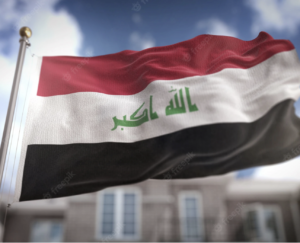
By Mohammed Abu Dalhoum – Aug 09, 2022
A Shiite-Shiite collision. This is how the recent turn of events in Iraq can be described. Following the announcement of Mohammed Shia Al-Sudani’s candidacy for prime minister last month, Muqtada Al-Sadr’s supporters stormed the Iraqi parliament in protest, leaving more than 125 people injured.
A supporter of Nuri Al-Maliki and very much an Iran affiliate, Al-Sudani is seen as both the antithesis of Al-Sadr and the epitome of what Iraqis are desperately looking to leave behind. With parliament suspended by Speaker Mohammed Al-Halbousi, the future of Iraq’s political stability and overall security conditions are in severe jeopardy.
Proponents of Al-Sadr believe his movement should form the government by virtue of it winning the most seats in last October’s election, albeit not the requisite two-third majority as per Iraq’s constitution. However, it has become known that Al-Sadr’s aspirations have transcended the government’s main office and now also look toward reconstructing Iraq’s political system.
Al-Sadr’s supporters have not been the only ones protesting at the parliament, as the pro-Tehran Coordination Framework urged its supporters to retaliate and march in front of the same building, sparking concerns over escalations and possibly even armed confrontations.
At the heart of this political standoff is the fact Iraq continues to be without a government. Despite winning more seats than any other group, Al-Sadr has been unable to form a government that would not include any Iran-backed rivals, particularly the Coordination Framework.
Further, caretaker Prime Minister Mustafa Al-Kadhimi has called for a national dialogue, but Al-Sadr does not want anything to do with that. Instead, his bloc withdrew from the parliament, demanding its dissolution and the holding of early elections, merely 10 months after the most recent vote.
The situation is indeed worrying, especially considering the leaked recordings of Al-Maliki, in which he was joined by an anonymous group that sought his legal umbrella and which claimed to have some seriously threatening military powers, ready to use to take over Iraq.
The extent to which this group is connected to Al-Sudani is unknown. Whether or not there is a direct link is beside the point, since a friend of a friend is also a friend. After all, Al-Sudani could very well be the requested umbrella to cover this operation.
As such, Iraq is currently in the midst of three evils. The first is bringing in Al-Sudani as prime minister, which would once again solidify Baghdad as Tehran’s right hand. With Al-Maliki’s protege at the helm, Iraq would turn away from any prospect of fighting corruption or the sectarianism that has engulfed the state for far too long.
The second of these evils is succumbing to armed escalations. Al-Sadr proclaimed his willingness to “be martyred” for his cause, while his rivals enjoy Iran’s armed support. With each party persistent in achieving their objectives, Iraq might unfortunately witness another bloody civil insurgency, the outcomes of which would be horrifying.
The third evil is another round of early elections, as Al-Sadr wants. It is difficult to imagine a high turnout rate for elections held less than a year from the last, which were also held early. Such a direction might further diminish Iraqis’ interest in voting and in democracy altogether.
While Al-Sadr is more than capable of urging his supporters to vote, he needs to do much more than that if he wants to gain the supermajority required by law to form a government.
There is one way Al-Sadr can articulate his path toward Iraq’s premier executive office. But for that to happen, it is integral to steer the discussion away from sectarianism and armed escalations. Instead, it is essential to define the discussion in terms of laws and politics. Meaning, at its core, this current issue is very much political, more so than it is sectarian.
One group wants to deviate away from Iranian influence over Iraq, while the other wants to maintain and enhance Tehran’s grasp. One group believes there needs to be a major change in the way politics is conducted in the country, whereas the other finds a haven in this bottleneck.
When the conversation shifts that way, ethno-religious and tribal affiliations become less important. An Iraqi need not be a supporter of Al-Sadr or a Shiite to reject increased Iranian influence in the country’s affairs.
Instead of rejecting a national dialogue, Al-Sadr could have taken the opportunity to widen his audience and attract further supporters. He could still fine tune his rhetoric and speak directly to other Iraqis, especially Sunnis and non-Arabs, who might oblige, since they have grown frustrated with seeing Iran meddling in Iraq.
It is difficult to see a wholly unified Iraq, given the prevalent divisions, but dissecting political disagreements is intrinsically different from dealing with sectarian conflicts. This gruesome situation could, perhaps, prove to be the necessary evil Iraq has needed for a very long time. If the cards are played right, we could see Iraqis demonstrating their support irrespective of their sectarian affiliations. Should that be the case, Iraq would become an environment far more conducive to political reform.
Mohammed Abu Dalhoum is Deputy CEO and Senior Research Analyst at NAMA Strategic Intelligence Solutions.
This article was originally published in Arab News on August 09, 2022. For the original article source, click here.
